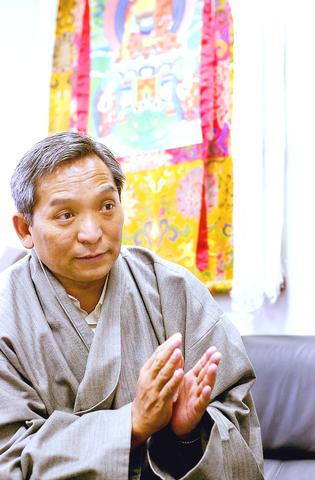Living in exile has many challenges, especially in a place like Taiwan, which only recently began to hush its past claims -- not unlike China -- that Tibet is a part of China.
But gradually, through increased interaction, a second visit by the Dalai Lama and hard work, culture can be preserved rather than lost, Tenzin Phuntsok Atisha, the managing director of the Tibet Religious Foundation of His Holiness the Dalai Lama (
"It's very important to preserve our identity and culture. I notice that some young Tibetans who came here or were born here don't speak the language, not to mention read or write it. We all have to put in a lot of effort in this respect," said Atisha sitting in his 10th floor downtown Taipei office.

PHOTO: CHEN CHENG-CHANG, TAIPEI TIMES
Aside from a colorful silk embroidered painting of the Buddha or Thangka and some pictures of the Dalai Lama, his office is decorated modestly, with only a few items that give any hint of his past and homeland.
Like many Tibetans in exile, Atisha and his family had to go through a significant ordeal in order to escape from Tibet.
Atisha says he still remembers vividly how brightly the snow shined in his eyes when he and his family members were crossing the Himalaya range when he was six years old.
"It was a sunny spring day. My father, brother and I were taking a path near our village to cross the Himalayas, while my mother was in another group. We saw so many dead people along the way.
"It was very, very scary. We eventually ran out of food, but luckily we made it to Nepal," he said.
The five-day journey led him to a new world that promised good food, a new life, education and a career.
Ironically for some of the 700 Tibetans who live in Taiwan, the government organization that helped them get to the country is the biggest obstacle in preserving their heritage and giving them a helping hand, he said.
The Cabinet's Mongolian and Tibetan Affairs Commission (
"That's why the Tibetans say that there are two Chinas: Red China and Black China. Fortunately, the situation changed dramatically in 1997 when the Dalai Lama first visited Taiwan. Now Tibetans no longer consider Taiwan as a `black China' but as our friends, our brothers and sisters," he said.
The commission is still there, however, only with its work minimized.
"We actually have great trust in and respect for the incumbent chairman, Mr Hsu [Hsu Cheng-kuang,
The commission has made life for some Tibetan immigrants in Taiwan miserable, Atisha added.
"Most of them came to Taiwan with the commission's assistance but they are at risk of becoming illegal residents.
"Their illegal status prevents them from finding a job or finding a job with a good salary," he said, adding that the foundation has been in touch with the Chen administration regarding the problem.
"[The administration is] very sympathetic and willing to solve the problem. I believe within months this problem will be solved," he said.
Atisha said that about 130 Tibetans are currently residing illegally in Taiwan, mostly in the Taipei area.

SECURITY: As China is ‘reshaping’ Hong Kong’s population, Taiwan must raise the eligibility threshold for applications from Hong Kongers, Chiu Chui-cheng said When Hong Kong and Macau citizens apply for residency in Taiwan, it would be under a new category that includes a “national security observation period,” Mainland Affairs Council (MAC) Minister Chiu Chui-cheng (邱垂正) said yesterday. President William Lai (賴清德) on March 13 announced 17 strategies to counter China’s aggression toward Taiwan, including incorporating national security considerations into the review process for residency applications from Hong Kong and Macau citizens. The situation in Hong Kong is constantly changing, Chiu said to media yesterday on the sidelines of the Taipei Technology Run hosted by the Taipei Neihu Technology Park Development Association. With

CARROT AND STICK: While unrelenting in its military threats, China attracted nearly 40,000 Taiwanese to over 400 business events last year Nearly 40,000 Taiwanese last year joined industry events in China, such as conferences and trade fairs, supported by the Chinese government, a study showed yesterday, as Beijing ramps up a charm offensive toward Taipei alongside military pressure. China has long taken a carrot-and-stick approach to Taiwan, threatening it with the prospect of military action while reaching out to those it believes are amenable to Beijing’s point of view. Taiwanese security officials are wary of what they see as Beijing’s influence campaigns to sway public opinion after Taipei and Beijing gradually resumed travel links halted by the COVID-19 pandemic, but the scale of

A US Marine Corps regiment equipped with Naval Strike Missiles (NSM) is set to participate in the upcoming Balikatan 25 exercise in the Luzon Strait, marking the system’s first-ever deployment in the Philippines. US and Philippine officials have separately confirmed that the Navy Marine Expeditionary Ship Interdiction System (NMESIS) — the mobile launch platform for the Naval Strike Missile — would take part in the joint exercise. The missiles are being deployed to “a strategic first island chain chokepoint” in the waters between Taiwan proper and the Philippines, US-based Naval News reported. “The Luzon Strait and Bashi Channel represent a critical access

Pope Francis is be laid to rest on Saturday after lying in state for three days in St Peter’s Basilica, where the faithful are expected to flock to pay their respects to history’s first Latin American pontiff. The cardinals met yesterday in the Vatican’s synod hall to chart the next steps before a conclave begins to choose Francis’ successor, as condolences poured in from around the world. According to current norms, the conclave must begin between May 5 and 10. The cardinals set the funeral for Saturday at 10am in St Peter’s Square, to be celebrated by the dean of the College